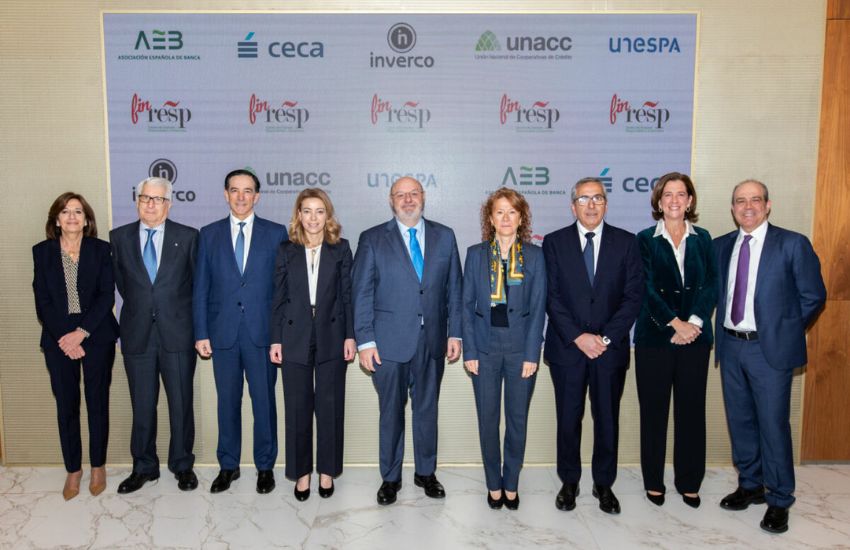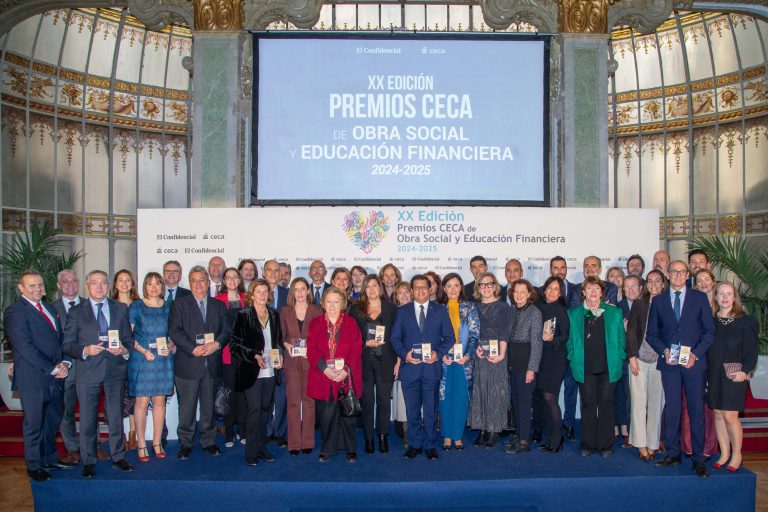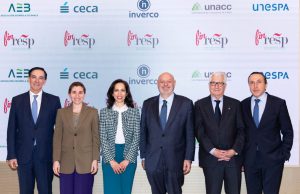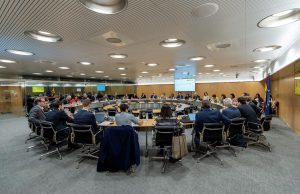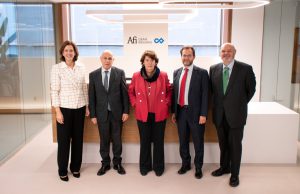FINRESP, the Spanish Centre for Responsible and Sustainable Finance and its promoting associations - AEB, CECA, INVERCO, Unaac and UNESPA -, held today its fourth annual conference, with the aim of addressing the main national and international outlook and strategies in the field of Sustainable Finance, as well as the challenges and opportunities emerging in the current context for Spain and the role of SMEs in advancing the sustainable transformation, among other issues.
The Chairman of FINRESP and CEO of CECA, José María Méndez, was tasked with the opening speech of the conference, in which he highlighted the sector's willingness to collaborate in the future Sustainable Finance Plan and the Green Paper on sustainable finance that the government plans to launch: 'We are facing a major challenge that requires the greatest possible collaboration between public and private bodies for sustainable transition. This effort requires resources and spaces for cooperation that are both multi-faceted and that also reflect the reality of the sector'.
In this regard, the conference welcomed the institutional presence of Paula Conthe, Secretary General for the Spanish Treasury and International Finance, who brought the event to a close, highlighting the creation of the advisory council as a meeting point for public-private collaboration, as well as pointing out in her speech that 'over the coming weeks, the public consultation on the Green Paper, which is in the final stages of preparation, will commence'.
Commitment to joint action by all economic agents
The goal of the conference was to analyse and discuss the key issues that are guiding the development of sustainable finance in Spain by the main stakeholders of the financial system. To this end, FINRESP brought together representatives from the industry, as well as from regulatory and supervisory bodies and the corporate sector.
The first panel, which focused on 'Spain's new political cycle: challenges and opportunities', was moderated by Méndez, and focused on risks and transparency in the financial sector, assessing the efforts undertaken so far and the challenges that lie ahead. During the session, the focus was placed on the role of the sector as a source of financing for a productive model compatible with the conservation of the environment. The panel featured Montserrat Martínez, Deputy Chairwoman of the CNMV, who pointed out the speed with which the regulatory model was developed and the need to have the right tools in place to implement it. José Carlos García de Quevedo, Chairman of ICO, and Margarita Delgado, Deputy Governor of the Bank of Spain, also participated, stating that: ‘'our primary objective is to promote a profound transformation to mitigate the climate risks associated with this transition in the economy'.
The second panel was chaired by Ángel Martínez-Aldama, Chairman of Inverco, together with Helena Viñes, Chairwoman of the Sustainable Finance Platform, and Antonio Santoro, Director of Southern Europe at Principles for Responsible Investment (PRI), on the 'European Sustainable Finance Strategy, its progress and outlook'. During the session, Helena highlighted the positive results yielded by the sustainable finance strategy and the European roadmap, despite the criticism. In this regard, Antonio Santoro pointed out that 'the plan was ambitious and that investors now have the tools to be aligned and to comply with regulations and develop good practices, with a positive response from the market'. Martínez-Aldama highlighted three relevant issues: 'The relevance of public-private collaboration; the need to strengthen engagement between financial sector entities and investors with the regulator; and the role of PRI as pioneers in implementing principles, the adoption of which was purely voluntary, prior to the existence of the regulations'.
The third discussion was chaired by Mirenchu del Valle, President of UNESPA. Elena Sanz, CEO of Mapfre Iberia, and Fausto Parente, Executive Director of EIOPA, also participated in this panel.Elena Sanz highlighted the increase in the number of adverse weather phenomena, both in Spain and in other countries, pointing out that: 'we are facing an unprecedented number of disasters, with greater frequency, volatility and cost'. On this point, Fausto added: 'people need to understand the problem that exists with climate change. There is a lot of room for public-private cooperation'. Similarly, del Valle agreed that 'climate risks and pensions are the two areas where society's protection shortfalls are most visible'.
Meanwhile, Alejandra Kindelán, Chairwoman of the AEB, chaired the discussion that focused on the management of sustainability, risks and financing, in which institutions play a fundamental role in accompanying companies. To address these issues, she was joined by Héctor Grisi, CEO of Santander Global; and Fernando Restoy, Chairman of the Financial Stability Institute. Grisi stressed the role of banks and how 'sustainability is always at the forefront of the discussion with customers, in different countries and regions, and thus has become a global issue'. Kindelán agreed, adding that 'the green transition is a driver of growth and competitiveness'.
Jerusalem Hernández, Sustainability and Good Governance partner at KPMG was in charge of moderating a panel with Antón Arriola, Chairman of Kutxabank, and Aniceto Zaragoza, CEO of OFICEMEN, in which they discussed the role of sustainable transition in decarbonisation. Arriola pointed out that 'Kutxabank has a sustainable DNA in its structure, where we work with our foundations to develop activities focused on sustainability and allocate more than 1 billion to implement them'. Similarly, Zaragoza stressed that: 'value is generated by customers, who require more sustainable and decarbonised construction and products. Tools such as the carbon footprint calculator provide value to the efforts we are undertaking'.
The role of SMEs and their outlook with regard to the challenge posed by the sustainable transition
The final phase of the conference addressed the situation of SMEs and the challenges they face in an environment marked by the sustainable transition. Under the theme: 'The real economy and SMEs faced with the challenge of the sustainable transition', Manuel Ruiz, Chairman of Unacc, was accompanied by prominent figures from the Spanish productive fabric, such as Luis Aribayos, Secretary General of CEPYME, and David Bernabéu, CEO of Citibox. Aribayos stressed that: 'it is essential to understand the reality of ESG criteria in SMEs. To do this, we must rely on data from the productive fabric to be able to make decisions’. Moreover, Ruiz pointed out 'the need for sustainability to be profitable for SMEs and highlighted the added value of the Sustainability Observatory that FINRESP is developing to provide data with which to respond to the challenges'.
Furthermore, during the debate it was announced that the results of the first edition of the Sustainability Observatory for SMEs, prepared by FINRESP in collaboration with CEPYME, will soon be published. This report will provide insight into the degree of adaptation of Spanish SMEs to the regulations and the outlook with regard to the sustainable transition. The project will be published shortly. In this regard, Bernabéu stressed the importance of the Observatory as 'it provides key aspects, such as access to financing for environmental projects in SMEs or the search for a path to move from theory to practice'.









